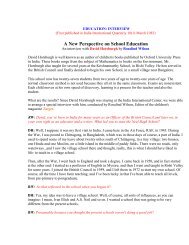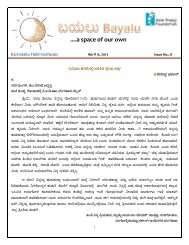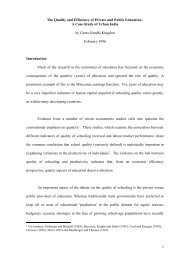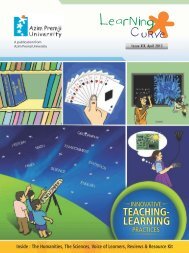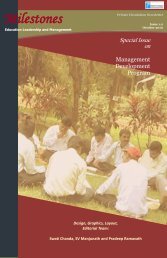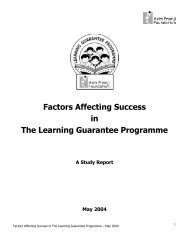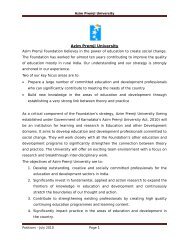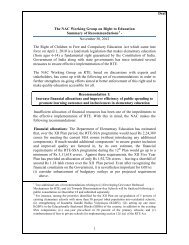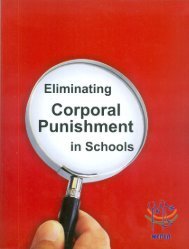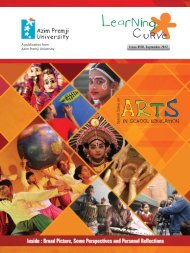all files - Azim Premji Foundation
all files - Azim Premji Foundation
all files - Azim Premji Foundation
You also want an ePaper? Increase the reach of your titles
YUMPU automatically turns print PDFs into web optimized ePapers that Google loves.
Policy Planning and Monitoring<br />
National Policy on Education (NPE)<br />
and Programme of Action (POA)<br />
The National Policy on Education (NPE), 1986<br />
along with its Revised Policy Formulation and<br />
the Programme of Action (POA) evolved as a<br />
result of widespread deliberations, consultation and<br />
consensus were last reviewed and updated in 1992. The<br />
POA envisages that given the rich diversity of our<br />
nation, it would be in the fitness of things, if the States<br />
and Union Territories formulate their State POAs in<br />
accordance with their situational imperatives as well as<br />
with the POA 1992.<br />
The National Policy on Education (NPE), 1986, as<br />
updated in 1992, envisages improvement and expansion<br />
of education in <strong>all</strong> sectors, elimination of disparities in<br />
access and laying greater stress on improvement in the<br />
quality and relevance of education at <strong>all</strong> levels,<br />
including technical and professional education. It also<br />
emphasises that education must play a positive and<br />
interventionist role in correcting social and regional<br />
imbalances, empowering women and in securing a<br />
rightful place for the disadvantaged, linguistic groups<br />
and minorities.<br />
The Nation is firmly committed to providing Education<br />
for All, the priority areas being free and compulsory<br />
primary education, covering children with special needs,<br />
eradication of illiteracy, vocationalisation, education for<br />
women’s equality, special focus on the education of SCs/<br />
STs and Minorities. The task of implementing the NPE<br />
and POA lies with the States and Union Territories, and<br />
the Centre is to monitor the implementation. The POA<br />
1992 was perceived on a charter of action for nation as<br />
a whole requiring a cooperative effort of the Union,<br />
States/UTs, the education community and community<br />
at large. Given the rich diversity of the country, certain<br />
amount of flexibility is assured in POA 1992 and it was<br />
felt that it would be in the fitness of the things if the<br />
States and UTs formulate their State POA’s in line with<br />
the situational imperatives and the POA 1992.<br />
Accordingly, the POA 1992 was circulated in 1993 to<br />
<strong>all</strong> States and Union Territories to draw up their own<br />
State Programmes of Action (SPOA).<br />
Central Advisory Board of Education (CABE)<br />
The Central Advisory Board of Education (CABE), the<br />
highest advisory body to advise the Central and State<br />
Governments in the field of education, was first<br />
established in 1920 and dissolved in 1923 as a measure<br />
of economy. It was revived in 1935 and had continued<br />
to be in existence till 1994. Thereafter, the CABE was<br />
reconstituted vide Resolution dated 6 th July, 2004.<br />
The CABE consists of Education Ministers of <strong>all</strong> the<br />
State Governments / UT Administrations; Ministers of<br />
the seven concerned Ministries of the Government of<br />
India; Member (Education), Planning Commission;<br />
Four Members of Parliament from the Lok Sabha; Two<br />
Members of Parliament from the Rajya Sabha;<br />
Seventeen Ex-officio Members; 34 Nominated<br />
Members representing different interests; and Ten<br />
Permanent Invitees representing various Central<br />
Government Departments.<br />
In the first meeting of the reconstituted Board held on<br />
10-11, August, 2004, it was decided to set up Seven<br />
Committees of the CABE on the issues which needed<br />
detailed deliberations. The Committees were:<br />
(a) Free and Compulsory Education Bill and other<br />
issues related to Elementary Education, under the<br />
chairmanship of Shri Kapil Sibal, MOS, Science &<br />
Technology.<br />
(b) Girls Education and the Common School System,<br />
under the chairmanship of Shri Tarun Gogoi, CM,<br />
Assam.<br />
(c) Universalisation of Secondary Education, under<br />
the chairmanship of Shri Ghanshyam Tiwari,<br />
Education Minister, Rajasthan.<br />
(d) Autonomy of Higher Education Institutions under<br />
the Chairmanship of Shri Kanti Biswas, Education<br />
Minister, West Bengal.<br />
(e) Integration of Culture Education in the School<br />
Curriculum, under the chairmanship of Prof. U.R.<br />
Ananthamurthy.<br />
(f) Regulatory Mechanism for the Text books and<br />
par<strong>all</strong>el text books taught in schools outside the<br />
Government system, Co-chaired by Prof. Zoya<br />
Hassan and Prof. Gopal Guru.<br />
Annual Report 2005-06<br />
34



